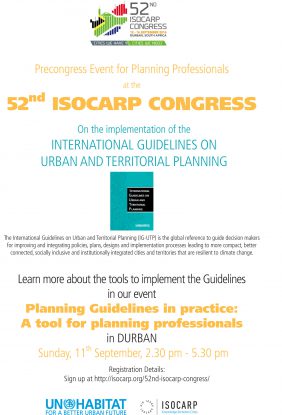Planning Guidelines in Practice: A Tool for Planning Professionals
11 September, 2.30pm-5.30pm (tentative)
Background
The International Guidelines on Urban and Territorial Planning (IG-UTP) provide with a global reference framework for improving global policies, plans, designs and implementation processes which will lead to more compact, socially inclusive, better integrated and connected cities and territories that foster sustainable urban development and are resilient to climate change. While the Guidelines serve as a compass to guide the review and reform of the planning system, a toolkit to operationalize and localize the principles is needed. A handbook to implement the Guidelines is being developed by UN Habitat to support this process.
The Handbook will include a methodology for self-assessment of the local planning system, while also providing with a set of indicators for monitoring and evaluating this process. While the tools are in development, UN-Habitat aims to use networking platforms and partner events such as the 52nd ISOCARP Congress, Habitat III in Quito and UCLG Congress in Bogota to share and seek validation of the tools with the target audiences of the Guidelines, namely national governments, local authorities, planning professionals and civil society organizations.
Objectives
- Provide an overview of the Guidelines and introduce the audience to the twelve planning principles and key recommendations of the Guidelines.
- Highlight the specific role of planning professionals in the use of the Guidelines.
- Understand how the Guidelines support the review and reform of the planning system for improving spatial policies, plans and designs.
- Introduce the forthcoming Handbook to operationalize the Guidelines illustrated with examples and engage a discussion on relevant tools and indicators.
- Draw the global relevance of the Guidelines and their unique value compared to other tools guiding spatial development.
Audience
Planning professionals are the main focus of the event. However, other attendees of the congress, including non-members of ISOCARP, development partners, and those working towards urban policies that are not spatially blind are welcome and may be interested to attend the learning event.
International Guidelines on Urban and Territorial Planning summary
REGISTER FOR THE EVENT HERE (Availability: 50 places first-come-first served basis; register on the website.)
